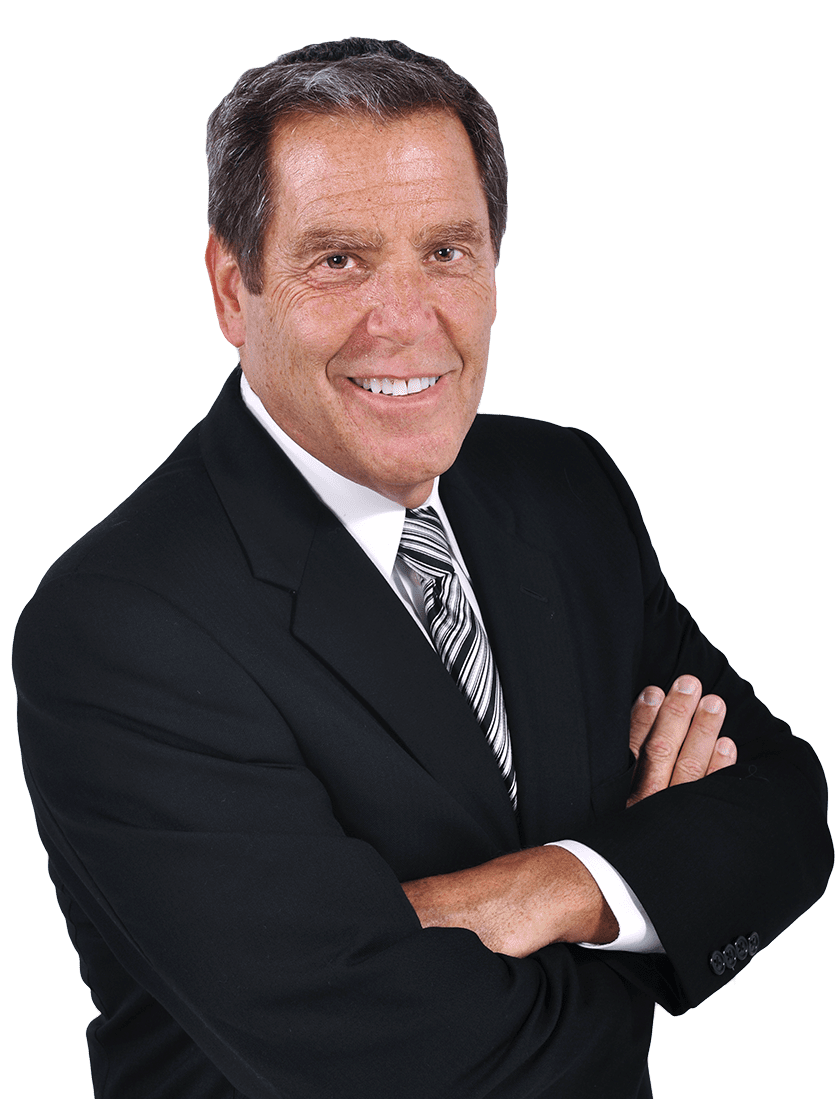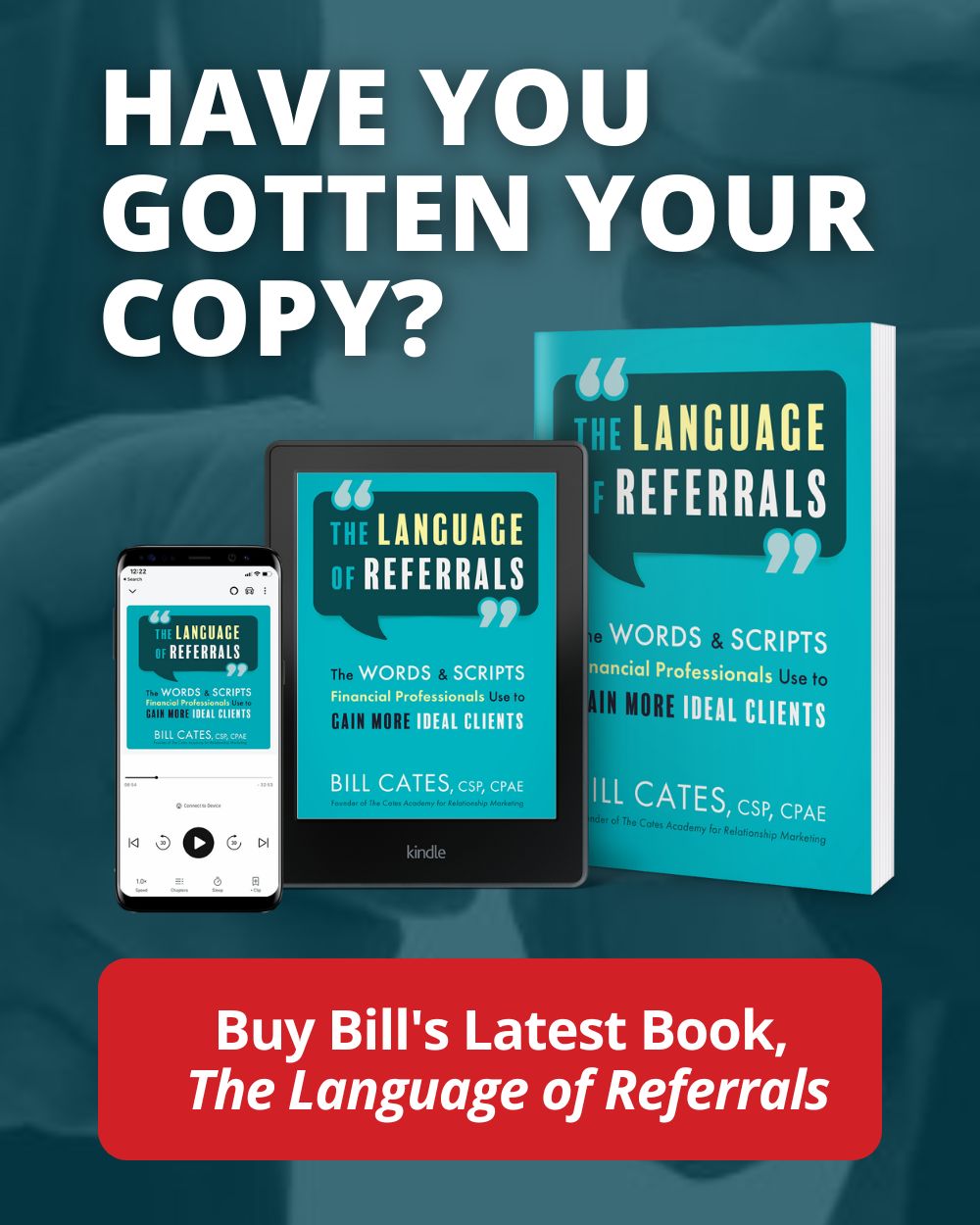Check Out Bill Cates’ NEW Top Advisor Podcast™
Interviews with Top Advisors for Top Advisors!
Top Advisor Podcast™
Ep. #4- Building a Financial Advisor Business Plan that Aligns with Your Ideal Life with Peter Oldziey, CFP®
Most financial advisors get into this business to create freedom and flexibility in their lives. The problem is, very few actually achieve that. Instead, they are tied to their business. The business owns them. Can you relate to the pain of this unhealthy scenario? If so, how do you create a financial advisor business plan that is actually in alignment with the life you WANT to lead?
In this episode, Referral Coach Bill Cates is joined by Peter Oldziey CFP®, of Peter A. Oldziey & Associates. Peter discusses his vision for his ideal life and business, and how he executed a business plan that created both.
Want More Top Advisor Podcast Episodes? CLICK HERE!
–
Peter Discusses:
- What triggered his decision to pursue his dream business and ideal life.
- How he honed in on providing unique client experiences.
- How his financial advisor business plan evolved into being “by-referral-only.”
- Why and how he used different forms of accountability to ensure his success.
Connect With Bill Cates:
-
Show Transcript
BILL CATES: Welcome to the top advisor podcast brought to you by ProudMouth Influence Accelerator Academy. I’m your host Bill Cates. In each episode, I interview one of the financial service industries top performers to learn their secrets to sustain success. These short interviews will get right to the heart of what each top advisor is doing to acquire more right fit clients.
You’ll be reminded, renewed, and inspired to take powerful action. You’ll impact more lives and increase your income at the same time. Now onto the show.
Welcome to the Top Advisor podcast, where I interview top advisors, for top advisors. Many years ago, I participated in Dan Sullivan’s strategic coach program. You’re probably familiar with his program and one meaning stands out in my memory above all others, where we were gathered in small groups discussing Dan’s concept of free days, where we’re actually supposed to be free of all business and relax and recharge. And each of us was lamenting that it felt like our staff took more time off from work than we did.
We were negotiating how much vacation time you get and you get and you get… and I’m thinking, what about me? So one reason we get into this business besides enjoying the work that we do and making a difference for our clients is to create the freedom and flexibility to live our ideal lifestyle. Yet in so many cases and including my own, I have to admit the business seems to own us and control us rather than the other way around.
Can you relate to the pain of this unhealthy scenario? Have you broken free and are now living your ideal life while still running an extremely successful business? Well, my guest for today is Peter Oldziey, CFP, who hails from Dover, Delaware. Peter’s here to tell us how he is living his ideal life and still running a successful financial planning business.
So Peter Oldziey, welcome to Top Advisor Podcast.
PETER: It’s great to be here, Bill. Thanks for having me.
BILL: It’s great to have you. I’ve enjoyed the pictures you sent over of some of your adventures and I’m a bit of an adventurer myself. So we could probably talk about that forever, but that’s not the point today. An ideal life, an ideal business. And that feels like a pretty big topic. So let’s start with the ideal life part. What was your life like before this transition and what does it look like now? And what triggered the decision to move in this direction?
PETER: My life wasn’t bad. I was running a moderately successful business. I think like a lot of advisors, we basically start off and accept anything that breathes you know, as a client.
And we try to work with that. And most of us really don’t have a unique experience that we can provide to clients. So in other words, we basically adjust to whatever the client is and so our value proposition changes and that’s kind of the way I was probably making about $250,000 a year with a single associate working 78 hours a week.
That’s what it looked like. So now what, what triggered it honestly, to join with Bill Backrack and his enterprise, if you will, to be coached by Bill B. was really a sense that what Bill B. was talking about from the standpoint of both a client experience, as well as an ideal life for an advisor, just absolutely resonated with me. Right away I was all in and allowed myself to be coached probably a lot longer than most people would take. It was a 10 year process, but I went from taking anybody to creating an ideal fit for clients. And that wasn’t something that happened right away. It happened over time. That would really, truly appreciate the value of what I was bringing.
I also created a unique experience that was coached by Bill B. along the way. And then I actually created a vision of my ideal life that included what I wanted to do, the time I wanted to have, as well as the money that I needed to make. So that’s how it worked.
BILL: And I know that part of that, “ideal life” is not working as much, more time for travel. I know you travel with your wife. And so how many now, how many days a year do you work?
PETER: When I talk to advisors, it honestly is financial advisor nirvana. I work 150 days and of those maybe, seven, eight hours tops in the day. I have a finely honed machine, or if you will have an office and we can even go into that because that’s such an important thing to build that team and delegate so that they own their piece of it.
And I have a hundred clients that I love interacting with. They feel it’s the best thing they’ve ever done. They give me all their money and do what I tell them to do.
BILL: All right. So you started with this vision for your ideal life, less work, more travel, working with the people you want to work with, et cetera.
And then I remember you told me that you work back from that, right? So you had this goal, this vision you started with the end in mind is often say, and then you built back from that. So tell us a little bit about the process, if you don’t mind.
PETER: So it is a numbers game, you just say, okay, well, because Bill B. always says time is zero.
It’s zero sum. It’s a zero sum game. We all have the same amount of time to say you don’t have enough time, or I wish there was more time. That’s a fallacy. We all have the same amount of time. Go from the standpoint of the time. What is it? How much time do I want? Number one. How much money do I want? And then figure out what it takes per client to offer that. And there was also the creation of a unique experience, you know, according to the Dan Sullivan model and then to repeat that experience for everybody.
So in other words, everybody gets this value obviously tailored to them, but that was a big part it. So then that developed into a hundred clients that where I needed to make X amount per client, and I needed to be able to have this type of client. So I would really enjoy coming to work every day.
BILL: So now let’s describe the ideal business.
Cause you did mention about the support structure that was in place, the team a well honed team, not easy. That’s often the complaint, right. If I could just get the right people in place. So talk to us about that. What ideas that you might have for other advisors to emulate that well honed team.
PETER: Yeah, that’s a great question. Advisors start with hiring staff rather than starting with their value proposition. What Dan Sullivan says is a unique experience. That’s not easy, you really have to look within and you’ve got to say, what is it that Peter truly is unique to have to offer? Right now the financial service industry has become highly commoditized.
Robo-advisors, exchange traded funds that are extremely low costs, et cetera. So why would people pay for this? It has to be an experience that they value. So you build that experience and you staff to that experience. Once, because it actually dictates everything you do.
The other thing that was important is I happen to use the Colby index, which measures instinct. And I’m a quick start by Colby. So I had to find staff people who complimented that, who could literally fill in the details and take care of things in a way that is not my genius for me to work on that stuff, I have a lot of strong weaknesses who cares. So I needed to focus on what I was good at. So it was part of finding the right compliment to me as well as what they would do is governed by the unique experience.
BILL: Put a little meat on the bone of that, deciding what that unique experience looks like and then hiring to that.
So did you have something you wanted to be able to deliver to clients that other people didn’t and then you had to find the right employee that could help with that? Is that what I’m hearing?
PETER: Yeah. Sullivan calls it front stage, backstage. Okay. So you start obviously for me, it was value-based financial planning to a large extent. Okay. That was really the foundation. And I became an expert in the financial roadmap conversation that was well honed as an experience, but then it’s a matter of really charting out the processes that then stem from that. The business processes, if you will, the client experience process, what is it, all the aspects that you want a client to experience coming in?
What do you want them to experience going out? What do financial reviews look like? How can that be set up in a way that I’m only doing it’s more like a surgeon, right? That it’s all set up for the surgeon, right? The surgeon comes in, obviously meets with the patient, but then comes in and does that very fine thing that only the surgeon can do.
Bill B. would always say, I think that’s also Sullivan, but only do what only you can do. And then everything else is a process that stems from that and then you hire to those processes. Does that make sense?
BILL: Yeah, that’s his unique ability. And so we’re getting a nice mix here of Bill Bachrach. A friend of mine. Had dinner with Bill about a week and a half ago. And by the way Peter, I mentioned you to him. He’s very fond of you. And he immediately, when I said Peter, I was forgetting Peter’s name, he says, “Ah, I know Peter, Peter Oldziey”. And then Dan Sullivan and a little bit of Bill Cates thrown into the mix here.
One thing in our prep for this interview, you talked about accountability. You told me to achieve this, it required accountability from different places, from the calendar, from your wife. Not everybody would do that. And members of your team. So just talk about how you use this concept of accountability to eventually create this.
PETER: Yeah. Client acquisition is just hard. It’s the hardest part of this business. And doing it the right way is hard. Doing it by referral only is hard. Okay. We always try to devise other, other ways of doing it. If you want to build a community of clients that look like each other, it’s by referral only.
And so that means following up and making phone calls and making phone calls and making phone calls and following up and all of that. It’s not how I would want to spend my time, but Bill Bachrach would always say, are you willing to do the work that the goal requires. That was it so needless to say, I avoided that sort of thing.
And I had to put in levels of accountability. I was accountable to a coach that I had that worked in Bill B.’s operation, but that wasn’t enough. Meeting every two weeks, that wasn’t enough. What I had to honestly do Bill was I had to let go of my calendar. So that I was not populating my calendar, my staff, or my wife who was working in the business at that time was populating the calendar.
And then my job was to work for them. I had to get to that mindset that I was working for them, obeying my calendar. And then I had to report on that. And so when I submitted to that process and it truly was because it had to be a humbling aspect of it, I submitted to the process. Then things started happening.
BILL: Yeah. I mean, it’s kind of a Zen thing if you think about it, right. Is letting go of that feeling of, I think, first of all, I think control is an illusion anyway, but a lot of us cling to the illusion of control. I had the same experience. I just did that with my assistant that recently I had her schedule a bunch of calls for me, and she set up a much better day than I would have done for myself.
Yeah, and I’m saying, all right, there’s a message here, Bill. So you’ve already mentioned, and I want to go a little deeper around this, a hundred percent referral only business. You had to work to get to that. And you told us about the accountability to get to that. And you also mentioned something to me that intrigues me about making each client meeting a celebration.
But before we dig into those ideas, let’s pause for a quick word from our great sponsor.
[SPONSOR MESSAGE] This podcast is sponsored by ProudMouth, the influence accelerators. If you’re like our clients, you want to spend more time educating people and less time selling. That’s why we turn main street experts like you into trusted mainstream authorities.
We help you amplify your influence over a growing audience of magnetically attracted fans who will chase you down instead. Visit proudmouth.com to learn more.
BILL: With me today, is CFP, Peter Oldziey, who is living an ideal life and running an ideal business. Peter, I can’t tell you how many times in the last 30 years of working with financial advisors that I’ve been asked, “So Bill, is it really possible to achieve a by-referral-only practice?” You and I know that the answer to that question is a resounding yes, but tell us have you been able to make that happen? And we know you worked hard to get it to a certain level of the right clients, but now it’s being maintained by referral only.
So talk about that. Talk about this “every client meeting as a celebration”, cause I have a feeling that’s related.
PETER: Yes, it is this unique experience and the financial roadmap that I learned as a profound first interview experience.
Again, a plug to Bill B. There’s not many systems where in an hour and a half or hour to an hour and a half clients trust you and are ready to give you all their money. It works not for everybody, but for the right client, it works. Then the client has this experience and they’ve experienced the implementation of their plan.
They’ve experienced the confidence that goes with it. They’ve experienced the staff along the way. Then after that they are now part of a community that they have a responsibility to build, because how would you want my time spent? Looking for a bunch of clients and having seminars and the like, or do you want me spending my time on you?
You can help me do that. Can you think of some people who you would want to have the experience that you have? You know, it would be a conversation with somebody, like, how are you feeling about what we’ve just done and they go crazy. Wouldn’t you like your friends and family to have this experience?
So tell me about them and, and who are they? And then take as much information as I can about each one of them and then have them follow up with those folks. And then also they would get some gifts from me and follow-up phone calls. But even with that, it takes work. I can tell some stories around that, that I’m at the 13th call in your own head you would have said that these folks are not interested anymore, but they were just busy. And they are one of my best clients and in fact referrals to my biggest clients, if you will, monetarily. So it takes that that kind of work. So the way it’s tied into this celebration. It’s just that. I always want to have clients expressing how they’re feeling about their lives.
Having gone through the experience and having a financial plan and having a trusted advisor and having all of their financial affairs in order. You know, and being able to reach their goals and be able to do the things that they really want to do with their lives. How does that feel?
So I want them to experience that every client meeting. They walk away really happy even in down markets and so on. They walk away happy because they know we’re on target. And then they are happy to refer. Now, I turned off my client acquisition system when I hit those hundred clients, but I still get referrals.
And now I’m really, really picky. I mean I’m really picky.
BILL: So two follow ups to that. First of all, how transparent are you with your clients about what you’ve created for yourself, a hundred clients, lots of free time helped me maintain this community so that we can continue to get a view of the great service.
How much is transparent with them. Do they know everything? A little bit of it? Give us a sense of that.
PETER: Yeah. I mean, basically part of the agenda of every meeting when I was in client acquisition mode was an agenda item called community of clients. And I would give them an update exactly where we are and toward our goal and why it was important that we achieved that goal.
Okay, because do you want a worn out adviser? Or do you want somebody who’s fresh and enjoying life? What I find now too, quite honestly, is that the clients really appreciate my living my ideal life, because it’s a life of purpose. It’s not just a matter of free time. I spend as much in volunteer work as I do at the office, but I’m living a purposeful life and they love to hear about that.
And part of that is these adventures. Time with Judy, time with family, all that they love hearing about it because that’s an inspiration to their lives. Because I’m doing for me, what I’m trying to help them do for themselves.
BILL: It would be inspiring. I think that makes sense. And then tell us a little bit about what is an ideal client for you. Everybody it’s different. Obviously they have to appreciate the processes, but can you give us a little more meat on those bones?
PETER: I find that one of the most important things is the capacity to trust. Not all, not everybody has that. So that’s one. The next one is to be able to care about somebody or something greater than themselves.
That was important. Whether it’s family, whether it’s community, whether it’s some type of charitable legacy, whatever it happens to be. A client that’s generous, that was very important to me and a delegator. Somebody who’s more interested in leading their lives than worrying about all the details of the finances. So they are able to trust and delegate to me and to my staff and to the experts that stand behind me. All of the money managers, insurance folks, and all of that.
BILL: How do you qualify for that? How do you determine that? Do you have certain questions or where they’ll kind of reveal that fairly quickly. So you can sense whether it’s a good fit or not?
PETER: Yeah, well that was part of my referral conversation anyway. I’m asking them for this. But still I got better and better at when I sensed a do-it-yourselfer in the process, I would very directly address it as time went on. I would say, you know, Bill referred you to me but this is what I’m sensing.
And, it looks like you’ve taken care of all your money yourself all along. And my experiences is that, that you may not get the value that I have to offer. What do you think? And honestly, I’ve had some recovering do-it-yourselfers. You know, people who say I’ve done it, I’m aware of it, but I really don’t want to do it anymore.
And I said, well, okay, so now if that’s the case, then here’s how it’s going to work. You don’t say thank you for this idea and then I’ll think about it. That doesn’t work. What works is that we’ll talk about it together here and make the decision at the table, because then you’re relying on me as an expert.
Bill B. would always say professionals don’t collaborate with amateurs.
BILL: Interesting. Except for maybe 18 holes on a golf course, that’s about it. I have a client that is similar when he asks for referrals, I teach having the words value discussion on the agenda, and that gets into making sure people see the value, et cetera.
This guy, Alvin, he puts down what he calls a community outreach. Which is kind of similar to what you’re talking about here, let’s bring this important work to other people. He says I’m only one person, so let’s work at it together. I have one more important question to ask you, but first let’s switch seats for a minute.
Switch hats, whatever the metaphor is, what’s a challenge that you’re facing, or what would you like to hear me talk about in terms of client engagement, marketing related to this conversation? Because I always like to try to add a little value myself in these shows.
PETER: What I’d like to hear, because I’ve obviously heard you, you’re very familiar in the industry, But I’ve not had the opportunity to meet you or really use your material.
But I’m curious as to what you do, as a referral coach that can help advisors like me lead an ideal life.
BILL: Well, I dunno if I can help you cause you’ve got it down pretty dang well, but I think I can help a few others with that. So, we’ve kind of touched on it already the first is, making a decision to build a referral based business, to not treat referrals, and I really should say introductions because we want to get connected. They’re not the icing on the cake. They are the cake. It’s the way people want to meet us. And it starts with a commitment to that because most advisors dabble in referrals, they know what to do with one if they trip over it, but they haven’t really made that commitment.
Look, getting referrals, getting introductions it’s not rocket science. It’s about confidence and a little bit of accountability in there to make sure you do it. So you build the confidence. Part of it’s that, but it’s also this notion of what I like to call right-fit client. Some people will say ideal client, best fit for me, or right fit client. It’s essentially someone you are meant to serve.
So my marketing person calls it the soulmate, your business soulmate, right? And so a right fit client is someone who will get your value and appreciate your value for all the reasons you want to be appreciated. I know you and I were talking about not everybody likes or wants or seems interested in the process you bring, right?
Okay, fine. We need to be able to own our value, own our system, own our process and communicate in such a way that it will attract the right people and repel the rest. Repel is a strong word, but you know, let them find someone else. And if someone isn’t a good match for you and your processes and the work that you want to do, then you’re not the right advisor for them.
It’s gotta be a win-win situation. To that end, part of that’s communicating with clients which I suspect you do. Who does fit, right? What are the parameters, whether it’s assets or income or not do-it-yourselfers. And some of the psychographic things you’ve talked about, but to make sure people who have the ability to send folks to you have a sense who a right fit is for you.
They may not know all of it. They may say, look, I don’t know if they’re exactly a perfect fit for you, Peter, but I think they touch a lot of the bases and I would love you to talk to them. Now, one other thing I’ll add to the mix. You haven’t necessarily done this. And one doesn’t need to do this to be successful in this business.
And with that said, I found that a lot of people who are able to build that ideal, business and therefore the ideal life do tend to target a market, a niche market. Whether it’s business owners in a specific industry, whether it’s nesting in a large company with the employees and executives or medical practices, because what happens is when you are targeted like that, the way you talk about your value is more effective. Their world, you have more empathy for their situation. They know people like themselves. They like the fact that you’re working with people like themselves that have similar situation, they start the bird dog for you. They start to tell you when other people are retiring in the organization or someone’s selling a business because they know you’re targeted in your niche. And I’ve interviewed a number of those folks and we’ll continue to interview them on Top Advisor podcast. So knowing your target and then the right fit client is the bullseye.
Who’s the target, what’s the target narrowed down. And generally speaking, the more narrow, the better. And when you know what the bullseye is, then you do everything you can do to get the bull’s eye, which you’ve done. And you haven’t done it with a target market. So it is possible to do it without a target market.
I just found for a lot of people, it’s a little easier, a little faster for some folks.
PETER: No, I think you’re absolutely right. It’s even a tighter community because they all speak the same language.
BILL: That’s right. My final question is this, I’d like you to think back over the last 12 months or so. What have you learned about this business and, or maybe even more importantly, what have you learned about yourself? Meaning how has Peter grown over the last year?
PETER: I’ll tell you how I’m going to answer that. I wrote this 11 years ago. When I decided to sit down and just, well, Bill B. said, write your ideal life.
And they were, I was at a seminar and he said, write your ideal life. And this literally flowed out of me. I’m going to read this and then I’m going to answer your question.
Life is a flow of beauty, moving at a pace of grace. I wake with deep gratitude each day, I focus on the sheer joy of meeting challenges that prod me, mold me and shaped me into an ever evolving noble creation of God.
I am deeply conscious of each moment, whether relaxing and having fun, going on new adventures, creating beautiful landscapes and photographs, serving my clients and helping them achieve self-actualized lives. Learning how to be of genuine service to people who are yearning for justice and love and hoping for a better future. Deepening relationships with my children and always deepening my love and admiration and respect for my beloved Judy. I want my passing to the world of the spirit to be seamless.
I’m telling you, honestly, this has been a touchstone for me. I go back to this all the time. And it has been a movement in that arena. A movement toward joy, which is greater joy and deep gratitude. I had the best year I ever had in the middle of this pandemic.
What a business! I got greater appreciation from clients during this period because we stayed close and stayed in touch in a period of uncertainty. But it’s this sense of evolving toward that vision. And I’m ever closer to it with deep gratitude, deep humility. That’s what I’ve learned.
BILL: I would wager a guess, it’s kind of at least reflect some of the essence of who you are, your prospects, your clients pick up on. And they’re attracted to it.
PETER: I think so.
BILL: And so that’s what gives that feeling of community. It’s more rewarding work, all that. I found this conversation very helpful for myself and I certainly hope those listening have found that as well.
Peter Oldziey, thanks a billion for being a guest. I appreciate it.
PETER: You’re welcome.
BILL: This is Bill Cates, reminding you that ideas do not make you more successful. Only acting on those ideas will bring you the success you desire.
Thank you for listening to the top advisor podcast brought to you by ProudMouth influence accelerator academy.
Click the subscribe button to be notified when new episodes become available. Visit my website, ReferralCoach.com for links to my books, courses, and online tools and to register for the Cates Academy.
About Our Guest

Peter Oldziey: Early in Peter Oldziey’s CFP® education career he realized he was an entrepreneur at heart and embarked on a career as a financial advisor. Peter has had his own practice in Dover, Delaware since 1986. Along with building a flourishing practice, Peter has put a high premium on professional development earning the designations of Chartered Financial Consultant (ChFC) in 1990 and CERTIFIED FINANCIAL PLANNER™ certificate in 2000.
Connect with Peter Oldziey:
![]()
Never Miss an Episode!
Click below to subscribe on your favorite podcasting platform.
P.S. Don’t keep Top Advisor Podcast a secret … share with a friend or colleague!
Click Here to Subscribe Tell a Friend

About Your Host
Bill Cates, CSP, CPAE, works with established financial advisors to speed up their growth without increasing their marketing budget. Advisors tap into Bill’s proven process to multiply their best clients through introductions from advocates and Centers of Influence (such as CPAs and attorneys), communicate their value proposition more effectively, and create a reputation in a profitable target market. Bill helps advisors move from push prospecting to magnetic marketing – to attract more Right Fit Clients™.
Bill is the author of four best-selling books, Get More Referrals Now, Don’t Keep Me a Secret, Beyond Referrals, and Radical Relevance. Bill is a highly sought-after international speaker and coach, as well as the founder of The Cates Academy for Relationship Marketing™.
Do you know someone Bill should interview (including yourself)?
Do you have a topic you’d like to see covered?
Contact Bill Cates directly: BillCates@ReferralCoach.com








